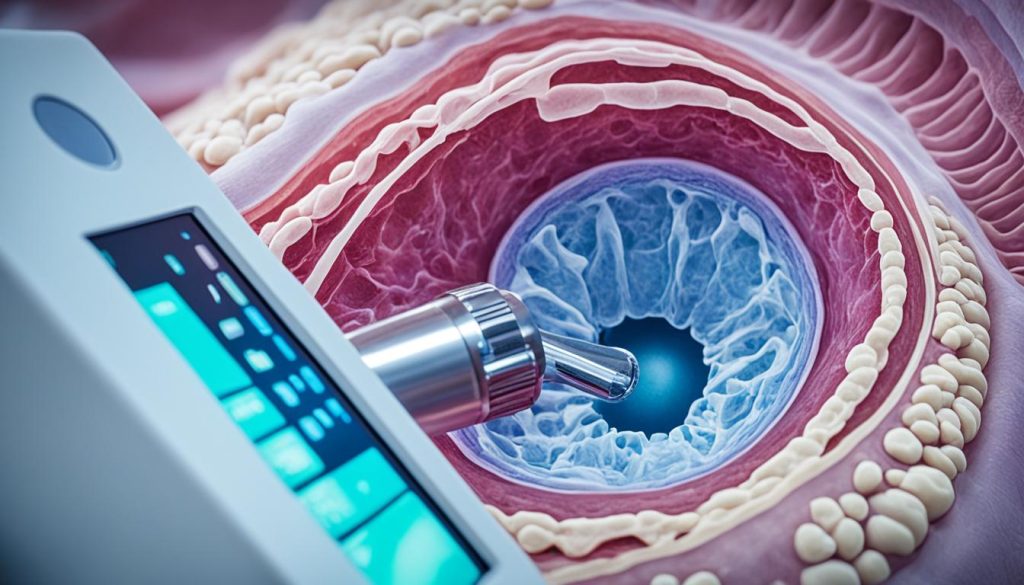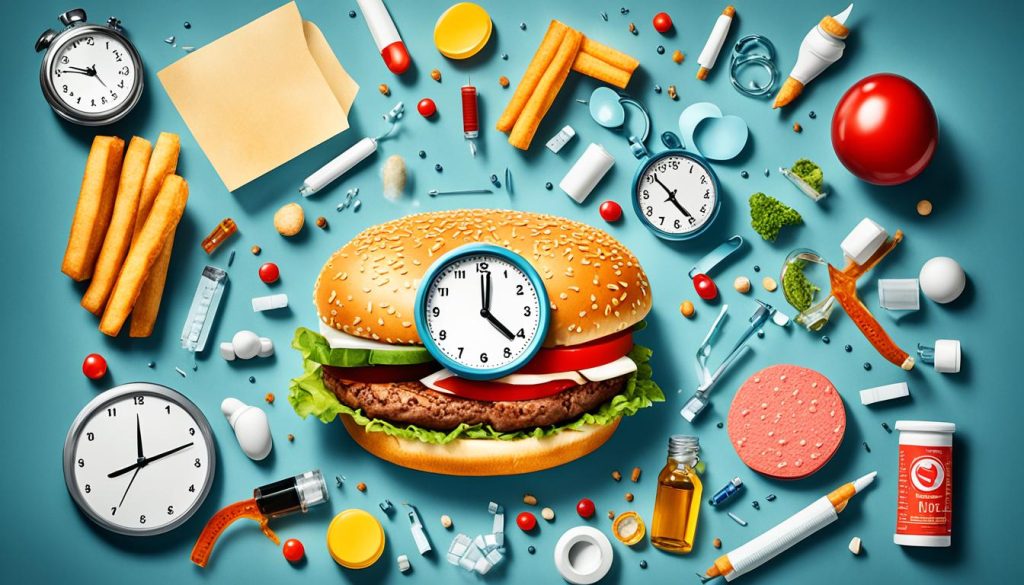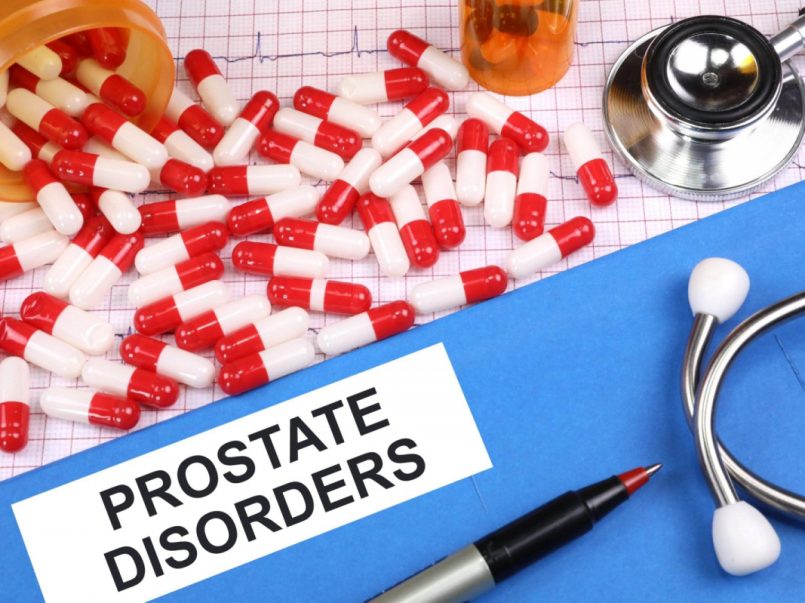Did you know almost half of men over 50 face prostate trouble? This sheds light on the need for good prostate health. The prostate is vital for the male reproductive system. It can suffer from various issues, including BPH, prostatitis, and cancer. Signs can be minor, from mild pain to serious problems such as erectile dysfunction and incontinence.
Spotting issues early is crucial. Tests like the digital rectal exam and PSA test help with early detection. Treating prostate problems might mean changing your lifestyle, taking medicines, or surgery in some cases. By knowing about these issues and staying ahead, you can keep your health in check.
What is the Prostate?
The prostate gland is crucial for men’s reproductive health. It’s also a big part of the urine system. Knowing about its anatomy and what it does helps keep men healthy, especially as they get older.
Anatomy and Location of the Prostate
The prostate is about the size of a walnut when men are young. It’s found below the bladder and in front of the rectum. It’s a key part of the male urine system. As men get older, it can get bigger, even as large as a lemon by age 60. This growth can cause problems.
This gland wraps around the urethra. The urethra is the tube that carries urine out. This is why problems with urination are often tied to prostate issues. The prostate’s position shows how important it is for urine problems as men get older.
The Prostate’s Role in Reproductive Health
The prostate is very important for having babies. It makes a fluid that carries and feeds sperm. This fluid is a vital part of semen. It helps men be fertile. This gland’s job connects prostate health to male reproductive health.
It’s important for men to get regular check-ups for their prostate. This is because it does a lot and can grow bigger. Knowing about the prostate’s parts and jobs can help find and fix health issues early.
Common Prostate Conditions
Many men deal with various prostate issues that can change their daily life. Knowing about these can help with early action and better treatment.
Benign Prostatic Hyperplasia (BPH)
BPH is a non-cancerous but worrying prostate growth. It often makes peeing hard and increases how often you need to go, especially at night. It’s common in older men because the prostate gets bigger as they age.
Prostatitis
Prostatitis is when the prostate is inflamed, often due to bacteria. Its symptoms are painful peeing, pain in the pelvis, and they can really do a number on your life. While it can affect men at any age, it’s more likely in younger to middle-aged men. It’s usually treated with antibiotics.
Prostate Cancer
Prostate cancer is a serious issue that starts in the prostate gland. Knowing the risks, like age, family history, and lifestyle, is key for early detection. This cancer might not show symptoms at first. So, regular checks are vital to find and treat it early.
Symptoms of Prostate Problems
It’s important to know the symptoms of prostate problems for early treatment. One major sign is having to pee a lot, especially at night. Men might also notice urinary incontinence, which means they sometimes can’t hold their pee.
If sex hurts when you ejaculate, it could mean a more serious problem. This painful ejaculation might come with finding it hard to start peeing or a weak stream. Also, seeing blood in your pee or sperm is a big sign you need to see a doctor soon.
| Symptom | Description |
|---|---|
| Frequent Urination | Needing to urinate more often, especially at night |
| Painful Ejaculation | Discomfort or pain during ejaculation |
| Urinary Incontinence | Involuntary leakage of urine |
| Weak Urine Stream | Difficulty starting urination or a reduced force in the stream |
| Blood in Urine or Semen | Presence of blood, a serious symptom that needs immediate consultation |
If any of these problems sound familiar, don’t wait to get help. Finding these issues early and treating them quickly can make a big difference in how well you do and feel.
Diagnosis of Prostate Conditions
Getting the right prostate diagnosis early is key for good health. Doctors do certain tests to check for prostate problems. These tests are designed to find any issues with the prostate.

Digital Rectal Exam (DRE)
The digital rectal exam (DRE) is a key method for diagnosing prostate problems. A doctor carefully feels the prostate by putting a gloved, lubed finger in the rectum. They’re feeling for anything unusual, like bumps or hard spots. These could point to issues like prostatitis or prostate cancer.
Prostate-Specific Antigen (PSA) Test
The PSA test looks at a person’s PSA level in their blood. PSA is a protein produced by the prostate, including when cancer is present. High PSA levels are concerning. They might mean the person has prostate cancer, BPH, or other conditions. Getting regular PSA tests helps watch for any changes.
Prostate Biopsy
If a digital rectal exam or PSA test show something’s not right, a prostate biopsy might be next. A biopsy collects small bits of prostate tissue for a close look under a microscope. This is to see if there are any cancer cells. The results from a biopsy help plan the best way to treat any issues with the prostate.
Knowing about these tests and how they fit in a prostate check-up is important. It helps make sure prostate health is looked after well.
Treatment Options for Prostate Conditions
Dealing with prostate issues means you have many treatment choices. The treatment option you pick depends on how serious and the type of issue you have.
Doctors often first give alpha-blockers or 5-alpha reductase inhibitors as medicines. Alpha-blockers help the prostate and bladder neck muscles relax. This makes urinating easier. 5-alpha reductase inhibitors, on the other hand, reduce the prostate’s size. They also prevent hormonal changes that lead to its growth.
If medicines don’t work, surgery might be the next step. One common surgery is Transurethral Resection of the Prostate (TURP). This surgery can help a lot with symptoms. But, surgery carries risks and you need to think about recovery time.
Some men look into herbal remedies to ease their symptoms. These are favored for being natural. But, it’s important to talk with your doctor first. This is to check if these prostrate remedies clash with any other treatment and if they really work.
It’s crucial to know the side effects of any treatment you choose. Talk with your healthcare provider about all your options. This ensures you make the best decision for your health.
Prostate Cancer: Risk Factors and Prevention
It’s key to know the risk factors for prostate cancer and how to possibly prevent it. Different things can up the chance of one getting prostate cancer, a major worry for men globally.
Age and Genetics
For prostate cancer, age matters a lot. Guys over 50 are more at risk. And if it runs in your family, your risk shoots up too. Knowing about genetics and prostate cancer helps with spotting it early and trying to stop it.

Lifestyle Factors
Your lifestyle can affect your risk too. What you eat and how much you move can make a big difference. This is especially true for African American men. If you smoke, that also bumps up your risk. But, eating well and staying active can help prevent prostate cancer and keep you healthy.
It’s important to grasp how genes and your everyday choices can both affect your risk of prostate cancer. By making smart choices and visiting your doctor regularly, you can do a lot to stay healthy and lower your chance of prostate cancer.
Managing Prostate Health: Tips and Lifestyle Changes
Keeping the prostate healthy is key to staying well. You can help by making some important changes to your daily life. Steps like these can really make a difference:
- Dietary Recommendations: Focus on a diet that includes lots of fruits, veggies, and whole grains. Eat foods with antioxidants, such as tomatoes, berries, and green tea, to help your prostate. It’s also wise to drink plenty of water, but cut back on fluids before bed to lessen trips to the bathroom at night.
- Physical Activity: Being active is very important. Try to get at least 30 minutes of exercise that gets your heart pumping each day. Activities like walking, running, and swimming can improve your health, including your prostate.
- Prostate Health Supplements: Some doctors might suggest certain supplements like saw palmetto, lycopene, and omega-3s. These are known to aid prostate health.
- Avoid Harmful Substances: It’s best to stay away from too much alcohol, caffeine, and junk food. These things can bother your bladder and make prostate problems worse.
By following these tips, you can boost your prostate’s health. But it’s always smart to talk to a healthcare provider for advice that fits your unique needs. They can guide you on what to eat and if you should take any supplements.
| Tips for Prostate Health Management | Actions |
|---|---|
| Dietary Recommendations | Eat a balanced diet rich in fruits, vegetables, whole grains, and stay hydrated. |
| Physical Activity | Engage in at least 30 minutes of moderate exercise daily. |
| Prostate Health Supplements | Consider supplements like saw palmetto and omega-3, under medical advice. |
| Avoid Harmful Substances | Limit alcohol, caffeine, and processed foods. |
Prostate Problems: Understanding Causes and Potential Complications
Prostate problems stem from many sources, with enlargement often occurring as men get older. Some growth is fine, but too much can bring about major health issues if not dealt with.

Factors Contributing to Prostate Enlargement
Aging and changes in hormone levels are key factors for prostate enlargement. As males age, their hormone balance, including testosterone and estrogen, shifts. This can spur on prostate growth.
This condition is called benign prostatic hyperplasia (BPH). It leads to various uncomfortable symptoms and needs close attention.
Complications of Untreated Prostate Issues
Not treating prostate issues can result in several complications. For example, an enlarged prostate can slow urine flow, increasing the chance of urinary tract infections.
In more severe scenarios, the bladder might suffer harm from back pressure and urine buildup. Eventually, this can lead to bladder stones or infections.
| Complications | Detail |
|---|---|
| Urinary Tract Infections | Increased risk due to obstructed urine flow. |
| Bladder Damage | Continuous pressure can weaken bladder muscle and lead to issues such as bladder stones. |
| Kidney Damage | Severe untreated cases can progress to kidney failure |
Seeing potential problems shows why prostate issues should be tackled early. Getting regular check-ups is crucial for spotting and dealing with these problems. This stops serious health effects later on.
Conclusion
Prostate health matters a lot for men’s well-being. Knowing its importance can make our lives better. It’s crucial to find any prostate issues early and deal with them.
Learning about conditions like prostatitis and prostate cancer helps you take care of your health. Signs like going to the bathroom a lot or pain when you climax need quick attention. This smart action is key to living well.
Choose a lifestyle that’s good for your prostate. This means eating well, being active, and following what your doctor says. Always talk to your doctor before trying new supplements or treatments.
By being proactive and talking to health experts often, you can stay well. This way, you make choices that keep you healthy over time.


